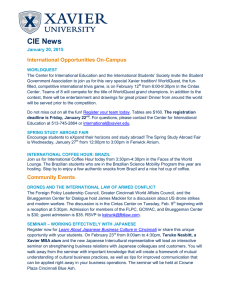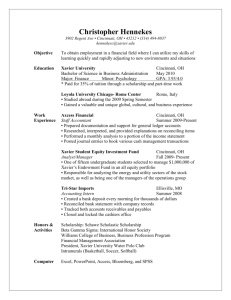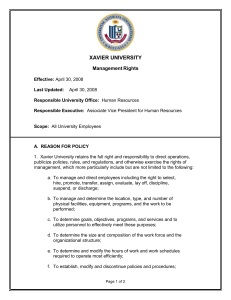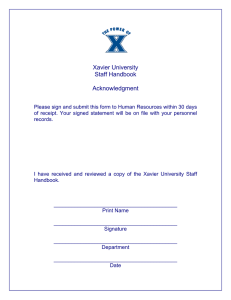Document 14358691
advertisement
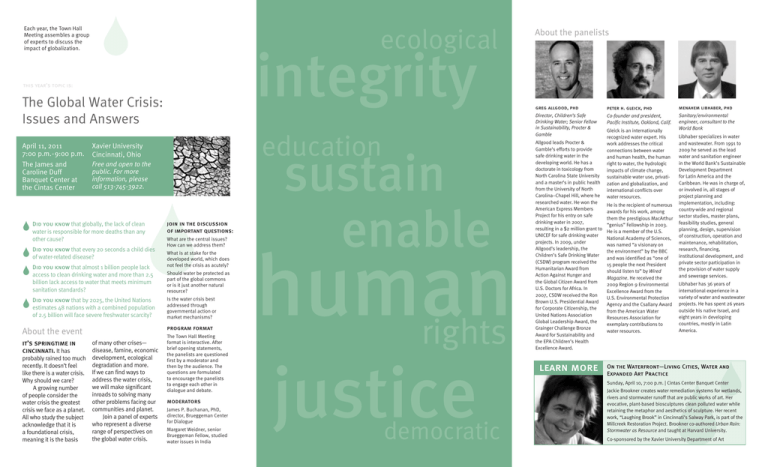
ecological Each year, the Town Hall Meeting assembles a group of experts to discuss the impact of globalization. integrity this year’s topic is: The Global Water Crisis: Issues and Answers April 11, 2011 7:00 p.m.- 9:00 p.m. The James and Caroline Duff Banquet Center at the Cintas Center Free and open to the public. For more information, please call 513-745-3922. Did you know that globally, the lack of clean water is responsible for more deaths than any other cause? Did you know that every 20 seconds a child dies of water-related disease? Did you know that almost 1 billion people lack access to clean drinking water and more than 2.5 billion lack access to water that meets minimum sanitation standards? Did you know that by 2025, the United Nations estimates 48 nations with a combined population of 2.5 billion will face severe freshwater scarcity? About the event it’s springtime in cincinnati. It has education Xavier University Cincinnati, Ohio of many other crises— disease, famine, economic probably rained too much development, ecological degradation and more. recently. It doesn’t feel like there is a water crisis. If we can find ways to address the water crisis, Why should we care? we will make significant A growing number inroads to solving many of people consider the other problems facing our water crisis the greatest crisis we face as a planet. communities and planet. Join a panel of experts All who study the subject who represent a diverse acknowledge that it is range of perspectives on a foundational crisis, the global water crisis. meaning it is the basis join in the discussion of important questions: What are the central issues? How can we address them? What is at stake for the developed world, which does not feel the crisis as acutely? Should water be protected as part of the global commons or is it just another natural resource? Is the water crisis best addressed through governmental action or market mechanisms? program format The Town Hall Meeting format is interactive. After brief opening statements, the panelists are questioned first by a moderator and then by the audience. The questions are formulated to encourage the panelists to engage each other in dialogue and debate. moderators James P. Buchanan, PhD, director, Brueggeman Center for Dialogue Margaret Weidner, senior Brueggeman Fellow, studied water issues in India sustain enable human rights justice democratic About the panelists greg allgood, phd peter h. gleick, phd menahem libhaber, phd Director, Children’s Safe Drinking Water; Senior Fellow in Sustainability, Procter & Gamble Co-founder and president, Pacific Institute, Oakland, Calif. Sanitary/environmental engineer, consultant to the World Bank Allgood leads Procter & Gamble’s efforts to provide safe drinking water in the developing world. He has a doctorate in toxicology from North Carolina State University and a master’s in public health from the University of North Carolina--Chapel Hill, where he researched water. He won the American Express Members Project for his entry on safe drinking water in 2007, resulting in a $2 million grant to UNICEF for safe drinking water projects. In 2009, under Allgood’s leadership, the Children’s Safe Drinking Water (CSDW) program received the Humanitarian Award from Action Against Hunger and the Global Citizen Award from U.S. Doctors for Africa. In 2007, CSDW received the Ron Brown U.S. Presidential Award for Corporate Citizenship, the United Nations Association Global Leadership Award, the Grainger Challenge Bronze Award for Sustainability and the EPA Children’s Health Excellence Award. learn more Gleick is an internationally recognized water expert. His work addresses the critical connections between water and human health, the human right to water, the hydrologic impacts of climate change, sustainable water use, privatization and globalization, and international conflicts over water resources. He is the recipient of numerous awards for his work, among them the prestigious MacArthur “genius” Fellowship in 2003. He is a member of the U.S. National Academy of Sciences, was named “a visionary on the environment” by the BBC and was identified as “one of 15 people the next President should listen to” by Wired Magazine. He received the 2009 Region 9 Environmental Excellence Award from the U.S. Environmental Protection Agency and the Csallany Award from the American Water Resources Association for exemplary contributions to water resources. Libhaber specializes in water and wastewater. From 1991 to 2009 he served as the lead water and sanitation engineer in the World Bank’s Sustainable Development Department for Latin America and the Caribbean. He was in charge of, or involved in, all stages of project planning and implementation, including: country-wide and regional sector studies, master plans, feasibility studies, general planning, design, supervision of construction, operation and maintenance, rehabilitation, research, financing, institutional development, and private sector participation in the provision of water supply and sewerage services. Libhaber has 36 years of international experience in a variety of water and wastewater projects. He has spent 26 years outside his native Israel, and eight years in developing countries, mostly in Latin America. On the Waterfront—Living Cities, Water and Expanded Art Practice Sunday, April 10, 7:00 p.m. | Cintas Center Banquet Center Jackie Brookner creates water remediation systems for wetlands, rivers and stormwater runoff that are public works of art. Her evocative, plant-based biosculptures clean polluted water while retaining the metaphor and aesthetics of sculpture. Her recent work, “Laughing Brook” in Cincinnati’s Salway Park, is part of the Millcreek Restoration Project. Brookner co-authored Urban Rain: Stormwater as Resource and taught at Harvard University. Co-sponsored by the Xavier University Department of Art Today’s complex issues demand that we move beyond isolated positions toward collaborative solutions that can only be found through dialogue. By listening to and understanding each other’s points of view, we can arrive at the commonalities from which lasting resolutions might grow. The Town Hall Meeting provides a public forum for interactive discussion, allowing for diverse town hall meeting perspectives to be heard on vital issues of our of agreement and opportunities for answers. 2000 BER 0211 day in the hope that we might identify areas Learn for yourself. event co-sponsors The Edward B. Brueggeman Center for Dialogue Xavier University Ethics/Religion and Society Program Xavier University Office of Interfaith Community Engagement Xavier University Sustainability Committee Xavier University American Jewish Committee Global Center of Greater Cincinnati Southern Ohio Export Council Cintas Institute for Business Ethics at Xavier University The Edward B. Brueggeman Center for Dialogue 3800 Victory Parkway Cincinnati, Ohio 45207-7111 Be part of the dialogue. April 11 | Cintas Center The Global Water Crisis: Issues and Answers
